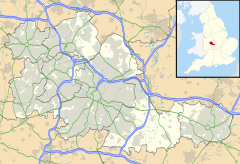Bordesley Green
| Bordesley Green | |
|---|---|
 South & City College Birmingham - Bordesley Green Campus |
|
| Bordesley Green shown within the West Midlands | |
| Population | 31,343 (2001 Population Census) |
| • Density | 74.81 per ha |
| OS grid reference | SP105865 |
| Metropolitan borough | |
| Metropolitan county | |
| Region | |
| Country | England |
| Sovereign state | United Kingdom |
| Post town | BIRMINGHAM |
| Postcode district | B9 |
| Dialling code | 0121 |
| Police | West Midlands |
| Fire | West Midlands |
| Ambulance | West Midlands |
| EU Parliament | West Midlands |
| UK Parliament | |
Bordesley Green is an inner-city area of Birmingham, England about two miles east of the city centre. It also contains a road of the same name. It is also a ward in the formal district of Hodge Hill. Neighbouring areas include, Alum Rock, Saltley, Small Heath and Yardley.
Heartlands Hospital is located in the eastern part of Bordesley Green. The area is also served by Yardley Green Medical Centre and Omnia Practice.
Kingfisher Country Park covers the River Cole recreation grounds which are partially covered by the area's boundaries.
The 2001 Population Census found that there were 31,343 people living in the ward. This makes it the second most populous ward, behind Sparkbrook. The ward has an area of 417.7 hectares resulting in a population density of 74.81 people per hectare. This makes the ward the third densest ward, behind Sparkbrook and Lozells and East Handsworth. Females represent 51.2% of the population, below the city average of 51.6% and the national average of 51.3%.
99.7% of residents lived in households, above the city average of 98.3%. The other 0.3% lived in communal establishments. The total number of occupied households in the ward was 9,350. This results in an average of number of people per household of 3.3, higher than the city of 2.5 and national average of 2.4. The majority of households are owner occupied (58%). 20.6% of occupied households are rented from Birmingham City Council, above the city average of 19.4%. 337 houses were identified as being vacant. Terraced houses built in the late 19th or early 20th century were the most common form of housing in the area at 54.4%, compared with the city average of 31.3% and the national average of 25.8%. At 25.4%, semi-detached houses were the second most common form of housing.
...
Wikipedia

